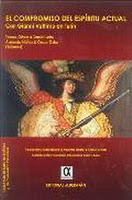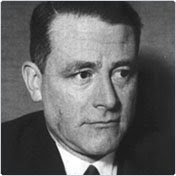El Papa en Cuba
Del fondo del abismo sale el rumor: "¡El nihilismo ha muerto!"
Víctor Samuel Rivera
Lamento estar demasiado ocupado y no tener la disponibilidad de tiempo que requeriría un post filosófico, uno que muestre y exprese en el brillo peculiar del rayo la gran revolución que se anuncia, y que se hace. El Papa es recibido en América Latina. Un atroz terremoto de grado 7.9 lo esperó primero, los elementos en anuncio de un nuevo horizonte sacude México, la antigua Nueva España. En El Origen de la obra de arte (1934), un ensayo de Heidegger que citamos aquí concierta frecuencia, su autor toma una ruptura de la Tierra para significar un horizonte nuevo de interpretación, en particular del mundo histórico-social. La apertura del abismo, el quiebre, la ruptura que, de pronto, hace visible lo oculto bajo el suelo simulador. Un novum asuma desde el abismo, allí donde había llanura hay hoy una mirada penumbrosa y fascinante.
 De pronto, el abismo es encuentro de los contrarios. Entre la bruma extraña de los antiguos enemigos, una nueva historia de los vencidos se emplaza en el hoyo del abismo. Hubo un tiempo, ¡tan cercano! en que el lenguaje de la "Aldea Global" y "el fin de las ideologías" aplastaba en un solo movimiento no ya a unos vencidos, sino a la totalidad del género humano. Pero hoy los derrotados que el liberalismo quiso aplastar hasta ayer se muestran triunfantes. Un cataclismo es la atmósfera ideal para mostar el carácter milagroso de esta sociedad, que es también fundación y don. El Papa defiende la Isla ahora del embargo que durante décadas la Gran Ciudad, la Ciudad del Comercio, había usado para erradicar a su enemigo, la Gran Isla, la Heroica. El terremoto es fiesta de la Tierra ante un nuevo lugar para lo santo. Ya en América, el Santo se dirige allí a una isla en forma de nave, que viaja oronda llena de regalos para el heraldo. Una nave: una nave que viaja frente al mundo nihilista, que le sonríe desde sus riquezas caducas. Hasta hoy la Isla era sola, lo que en la Biblia sabemos significa desamparada, sin marido. Eso era, pero ya la mujer sola no lo estará más.
De pronto, el abismo es encuentro de los contrarios. Entre la bruma extraña de los antiguos enemigos, una nueva historia de los vencidos se emplaza en el hoyo del abismo. Hubo un tiempo, ¡tan cercano! en que el lenguaje de la "Aldea Global" y "el fin de las ideologías" aplastaba en un solo movimiento no ya a unos vencidos, sino a la totalidad del género humano. Pero hoy los derrotados que el liberalismo quiso aplastar hasta ayer se muestran triunfantes. Un cataclismo es la atmósfera ideal para mostar el carácter milagroso de esta sociedad, que es también fundación y don. El Papa defiende la Isla ahora del embargo que durante décadas la Gran Ciudad, la Ciudad del Comercio, había usado para erradicar a su enemigo, la Gran Isla, la Heroica. El terremoto es fiesta de la Tierra ante un nuevo lugar para lo santo. Ya en América, el Santo se dirige allí a una isla en forma de nave, que viaja oronda llena de regalos para el heraldo. Una nave: una nave que viaja frente al mundo nihilista, que le sonríe desde sus riquezas caducas. Hasta hoy la Isla era sola, lo que en la Biblia sabemos significa desamparada, sin marido. Eso era, pero ya la mujer sola no lo estará más.Llega el Papa a la Isla, esa heroica, la Gran Isla, la nave del evento. Ha resistido 40 años las embestidas de la terrible marejada del nihilismo, sola, en su nave. 40. El tiempo bíblico de la prueba. Pues 40 días vagó Noé sobre la nave por entre la Tierra devastada por el Diluvio. 40 días pasó Jesús en el desierto. La Isla, la Grande y heroica Isla, ha sobrevivido al nihilismo y al pensamiento único a su manera, en la forma del comunismo. Hoy la Isla es el lugar de un nuevo comunismo: el comunismo que tardó una prueba de 40 años para encontrarse con el Papa. En la Isla el régimen de la revolución ha decretado tres días de asueto, para que ningún obrero tenga motivo para desairar al Santo Padre. Y el Papa, que en América Latina es también el padre de los pobres, representa lo santo al que la Tierra hace una incontrastable reverencia al anunciarlo con un cataclismo.

El que entienda, que se alegre.
En estos, los tiempos nuevos, resuena eterno el Evento. ¡El misterio y la disidencia en nupcias! Alianza de los vencidos en la nueva historia donde, desde el pasado común de la nave y su visitante donde cundió alguna vez el dinero, los sobrevivientes portan el mensaje: ¡El nihilismo ha muerto! Un nuevo rumor corre ahora, aunque no por Europa, sino por esta América, cuyo rumor juntó en una misma visita al Presidente Hugo Chávez, a la familia reinante de Cuba y al Patriarca del Occidente. Atentos al cataclismo del acontecer.
Caetera desiderantur...















































